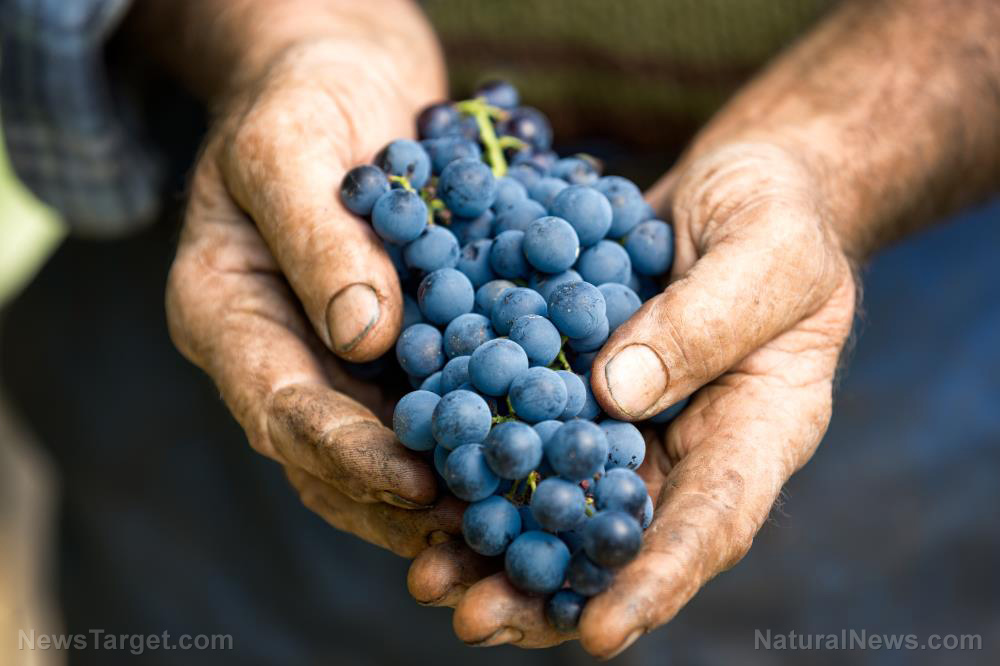Recent studies have found that the antioxidants found in grapes may have anticancer properties.
As the global quest for natural cancer-fighting solutions continues, there is increasing concern about the rising incidence of cancer among adolescents and young adults. Despite advancements in treatment, these methods are often costly, invasive and associated with significant adverse side effects.
Fruits play a vital role in a healthy, plant-based diet. They combat inflammation and chronic conditions that lead to cancer. The shift in focus toward prevention is seen as a promising alternative.
Antioxidants prevent damage to cells by neutralizing harmful molecules called free radicals. Without antioxidants, free radicals can cause DNA damage which could lead to cancer. (Related: Sermon 49: Mike Adams discusses GRAPES as God’s amazing natural medicine and nutrient powerhouse.)
Grapes are rich in various antioxidants – particularly phenolic compounds – which are known for their potential health benefits. Key antioxidants in grapes include anthocyanins, catechins, phenolic acids, procyanidins and resveratrol. Fresh grapes contain between 63 and 182 milligrams of these phenolic compounds per 100 grams. Most of these antioxidants are concentrated in grape skins and seeds.
Anthocyanins are the predominant flavonoids in red grapes. Meanwhile, grape seed extracts have shown high concentrations of flavonoids like catechin and epicatechin, as well as phenolic acids like caffeic and gallic acids. Resveratrol, another prominent antioxidant, is mainly found in grape skins but in lower concentrations.
Grape phenolic compounds and their anticancer properties
Grape antioxidants, especially those found in grape seeds, have shown promising effects in fighting various types of cancer. These compounds are known as grape seed proanthocyanidins. These have been effective in laboratory studies for inhibiting the growth of cancer cells in the following ways:
Breast cancer. A special grape seed extract rich in procyanidins interferes with the breast cancer cell’s key growth signaling pathways – leading to a halt in cell division and growth.
Colon cancer. Grape seed extracts and other grape components stop cell growth and induce cell death (apoptosis). The combination of resveratrol, with grape seed extracts enhances these effects by affecting key proteins involved in cell death and growth.
Head and neck cancer. Grape seed extract causes cell cycle arrest, which means stopping cells from dividing, thus inducing cell death. This is achieved through activating processes that check for DNA damage and increasing harmful reactive oxygen species inside cells, which leads to cell death. Grape seed extract also affects key proteins that help the cancer cells move and invade other tissues.
Lung cancer. In non-small-cell lung cancer, which is a common type of lung cancer, grape seed proanthocyanidins can increase proteins that promote cell death and decrease proteins that protect cancer cells. They also disrupt the mitochondria and activate certain enzymes involved in cell death.
Oral cancer. Grape seed extract halts oral cancer growth and induces cell death in a dose-dependent manner, which means more grape seed extracts lead to greater effects. It also reduces the cancer cells’ ability to suppress enzymes that allow cancer cells to migrate and invade other tissues.
Prostate cancer. Grape seed extract can block certain enzymes that help cancer cells grow and invade healthy tissues. It also reduces the activity of proteins that promote cancer spread.
Skin cancer. In melanoma, a serious skin cancer, grape seed proanthocyanidins can reduce the ability of cancer cells to invade and migrate. This effect is linked to a decrease in specific proteins that contribute to cancer cell movement.
These study findings suggest that grape seed antioxidants could be a valuable addition to cancer prevention and treatment strategies – offering natural options to support health and combat various cancers.
Watch this video about the benefits of grape seed extract.
This video is from the Holistic Herbalist channel on Brighteon.com.
More related stories:
Sermon 12: Mike Adams discusses the use of APRICOT KERNELS as an ANTICANCER treatment.
Lycopene: Harnessing natural carotenoids for cancer prevention.
The mighty BLUEBERRY, a superfruit with anticancer properties.
Sources include:
OnlineLibrary.Wiley.com
Cancer.OSY.edu
JAMANetwork.com
Brighteon.com
Read full article here


